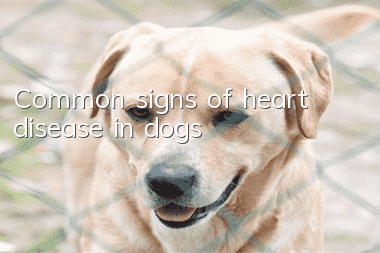Common signs of heart disease in dogs

The heart is responsible for the pumping function of sending blood to all parts of the body. If the pumping function cannot operate normally, it will not be able to transport blood to the lungs and the whole body, and it will not be able to recover the blood returned from the lungs and the whole body, thus causing Reduced blood flow and congestion, etc. According to statistics, 10 to 15% of dogs suffer from varying degrees of heart disease. Moreover, it has become the second largest killer of dogs after cancer.
Dogs’ heart problems are more serious than humans
1. There are countless congenital heart diseases caused by reproduction problems alone. There are also many heart problems caused by injury and infection, heart failure, and heart problems in dogs after middle age.
2. Small/toy breed dogs are prone to heart problems, such as common Chihuahuas, Pomeranians, Poodles, Cavalier King Charles Spaniels, Boston Terriers and Dachshunds.
3. Some large breed dogs are also prone to heart problems, including: Spotted, Doberman, Boxer, Great Dane, Old Shepherd, Newfoundland, Alaska, etc.
Common signs of heart disease in dogs:
Cough
Coughs caused by respiratory infections usually resolve within a few days with simple treatment. Coughs caused by heart disease are different. This kind of cough usually occurs after the dog exercises or at night.
Shortness of breath
This is perhaps the most well-known sign of heart disease. When the heart loses pressure to inject blood into all parts of the body, the lungs are forced to work at high load to seek more fresh oxygen and more blood flow.
If your dog keeps panting at some "weird" times, such as when it's not very hot, not just after exercise, or when sleeping or resting, you need to pay attention!
Loss of appetite
Many conditions that cause discomfort in dogs can cause loss of appetite, including heart disease. Because of changes in health, dogs will lose interest in food.
Weight loss or weight gain
Pets with heart disease will not lose weight immediately. Although they have a loss of appetite, they sometimes even gain weight. But in the advanced stages of heart disease, weight will drop again.
Weight gain is different from other forms of obesity. It is more likely to be a bulging and enlarging belly. This is a buildup of fluid in the abdomen due to blocked blood flow and poor circulation.
Easily tired
Because of the low efficiency of the heart, it is difficult for the heart to provide oxygen and other nutrients to other parts of the body, causing dogs to lack physical strength and become fatigued easily.
Changes in behavior
Dogs with heart disease may also behave differently. They may like to be alone, be depressed, or lose interest in toys they previously enjoyed.
Fainting
If your dog suddenly falls or faints, you need to seek medical help immediately. This can often be a sign of a serious health problem, such as heart disease.
There are many causes of heart disease. Congenital and hereditary heart disease is a big cause, and the aging of the body of middle-aged and elderly dogs is a big cause. There are many types of heart disease. In addition to surgery, many of the symptoms can only be relieved through health care products and medicines.
If your dog has the above signs of heart disease, it is recommended to seek medical attention as soon as possible so that targeted improvements can be made in life habits.
- What to do if Teddy has tear stains? Causes and treatment methods for Teddy to have tear stains!
- What are the key points for raising golden retrievers?
- Do Fawn Dogs shed hair?
- What's wrong with my puppy's urine?
- How many days after birth can a puppy eat?
- Teach you how to listen to your dog’s voice
- How to treat pyrozoonosis in dogs
- Do you know Alaskan Huskies? Are they easy to raise?
- Why does the puppy sleep every day?
- Why does my dog’s belly feel so hot?



